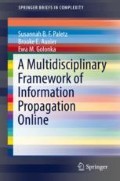Abstract
This book contributes to the study of the propagation of information on social media by reviewing a broad multidisciplinary literature, leveraging theory and findings from information sciences, psychology, sociology, communication, political science, and more. We created a framework of information sharing on social media that also included findings from a qualitative analysis of 20 fake news stories. Although this work is thorough, it is not entirely exhaustive. Future work can, for example, examine the perception of and inherent truth of messages. The next phase of research would be to create metrics for those factors that currently lack them so as to quantitatively assess how they interact in a more finely defined model. Given that most of these factors have been examined in isolation, field studies are important to determine the relative weights of these factors. It is crucial that research that examines user-generated content be held to the ethical standards of other research. As technology develops and information warfare increases, it becomes necessary to better understand how these factors impact information sharing and the information environment.
Access this chapter
Tax calculation will be finalised at checkout
Purchases are for personal use only
References
Carley, K., Cevone, G., Agarwal, N., & Liu, H. (2018). Social cyber-security. In H. Bisgin, A. Hyder, C. Dancy, & R. Thomson (Eds.), Proceedings of the International Conference SBP-BRiMS 2018 (pp. 389–394). Cham: Springer.
Chessen, M. (2017). The MADCOM future: How artificial intelligence will enhance computational propaganda, reprogram human culture, and threaten democracy….and what can be done about it. Washington, DC: Atlantic Council.
Doré, B. P., Scholz, C., Baek, E. C., Garcia, J. O., O’Donnell, M. B., Bassett, D. S., et al. (2018). Brain activity tracks population information sharing by capturing consensus judgments of value. Cerebral Cortex, 1, 9. https://doi.org/10.1093/cercor/bhy176
Gelfand, M. J., Severance, L., Lee, T., Bruss, C. B., Lun, J., Abdel-Latif, A.-H., et al. (2015). Culture and getting to yes: The linguistic signature of creative agreements in the United States and Egypt. Journal of Organizational Behavior, 36, 967–989.
Hermida, A. (2014). Tell everyone: Why we share and why it matters. Toronto: Anchor Canada (Penguin Random House Canada).
Lazer, D. M. J., Baum, M. A., Benkler, Y., Berinsky, A. J., Greenhill, K. M., Menczer, F., et al. (2018). The science of fake news: Addressing fake news requires a multidisciplinary effort. Science, 359, 1094–1096.
Nimmo, B. (2019, May 19). Anatomy of an info-war: How Russia’s propaganda machine works, and how to counter it. Retrieved from https://www.stopfake.org/en/anatomy-of-an-info-war-how-russia-s-propaganda-machine-works-and-how-to-counter-it/
Paletz, S. B. F. (Ed.). (2018). Measuring emotions in social media: Examining the relationship between emotional content and propagation. College Park, MD: University of Maryland Center for Advanced Study of Language.
Sanovich, S., Stukal, D., & Tucker, J. A. (2018). Turning the virtual tables: Government strategies for addressing online opposition with an application to Russia. Comparative Politics, 50(3), 435–454.
Starbird, K., Arif, A., Wilson, T., Van Koevering, K., Yefimova, K., & Scarnecchia, D. (2018). Ecosystem or echo-system? Exploring content sharing across alternative media domains. In 12th International AAAI Conference on Web and Social Media (ICWSM-18) (pp. 365–374). Stanford, CA.
Stutzman, F. (2006). An evaluation of identity-sharing behavior in social network communities. Journal of the International Digital Media and Arts Association, 3, 10–18.
Tsvetkova, M., Garcia-Gavilanes, R., Floridi, L., & Yasseri, T. (2017). Even good bots fight: The case of Wikipedia. PLoS One, 12, e0171774. https://doi.org/10.1371/journal.pone.0171774
Vosoughi, S., Roy, D., & Aral, S. (2018). The spread of true and false news online. Science, 359, 1146–1151.
Author information
Authors and Affiliations
Rights and permissions
Copyright information
© 2019 The Author(s), under exclusive license to Springer Nature Switzerland AG
About this chapter
Cite this chapter
Paletz, S.B.F., Auxier, B.E., Golonka, E.M. (2019). Discussion and Conclusion. In: A Multidisciplinary Framework of Information Propagation Online. SpringerBriefs in Complexity. Springer, Cham. https://doi.org/10.1007/978-3-030-16413-3_8
Download citation
DOI: https://doi.org/10.1007/978-3-030-16413-3_8
Published:
Publisher Name: Springer, Cham
Print ISBN: 978-3-030-16412-6
Online ISBN: 978-3-030-16413-3
eBook Packages: Social SciencesSocial Sciences (R0)

